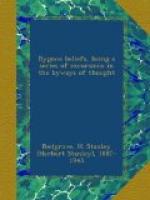However, all the alchemists were not of the apparent character of SENDIVOGIUS—many of them leading holy and serviceable lives. The alchemist-physician J. B. VAN HELMONT (1577-1644), who was a man of extraordinary benevolence, going about treating the sick poor freely, may be particularly mentioned. He, too, claimed to have performed the transmutation of “base” metal into gold, as did also HELVETIUS (whom we have already met), physician to the Prince of Orange, with a wonderful preparation given to him by a stranger. The testimony of these two latter men is very difficult either to explain or to explain away, but I cannot deal with this question here, but must refer the reader to a paper on the subject by Mr GASTON DE MENGEL, and the discussion thereon, published in vol. i. of The Journal of the Alchemical Society.
In conclusion, I will venture one remark dealing with a matter outside of the present inquiry. Alchemy ended its days in failure and fraud; charlatans and fools were attracted to it by purely mercenary objects, who knew nothing of the high aims of the genuine alchemists, and scientific men looked elsewhere for solutions of Nature’s problems. Why did alchemy fail? Was it because its fundamental theorems were erroneous? I think not. I consider the failure of the alchemical theory of Nature to be due rather to the misapplication of these fundamental concepts, to the erroneous use of a priori methods of reasoning, to a lack of a sufficiently wide knowledge of natural phenomena to which to apply these concepts, to a lack of adequate apparatus with which to investigate such phenomena experimentally, and to a lack of mathematical organons of thought with which to interpret such experimental results had they been obtained. As for the basic concepts of alchemy themselves, such as the fundamental unity of the Cosmos and the evolution of the elements, in a word, the applicability of the principles of mysticism to natural phenomena: these seem to me to contain a very valuable element of truth—a statement which, I think, modern scientific research justifies me in making,—though the alchemists distorted this truth and expressed it in a fantastic form. I think, indeed, that in the modern theories of energy and the all-pervading ether, the etheric and electrical origin and nature of matter and the evolution of the elements, we may witness the triumphs of mysticism as applied to the interpretation of Nature. Whether or not we shall ever transmute lead into gold, I believe there is a very true sense in which we may say that alchemy, purified by its death, has been proved true, whilst the materialistic view of Nature has been proved false.
X
THE PHALLIC ELEMENT IN ALCHEMICAL DOCTRINE




